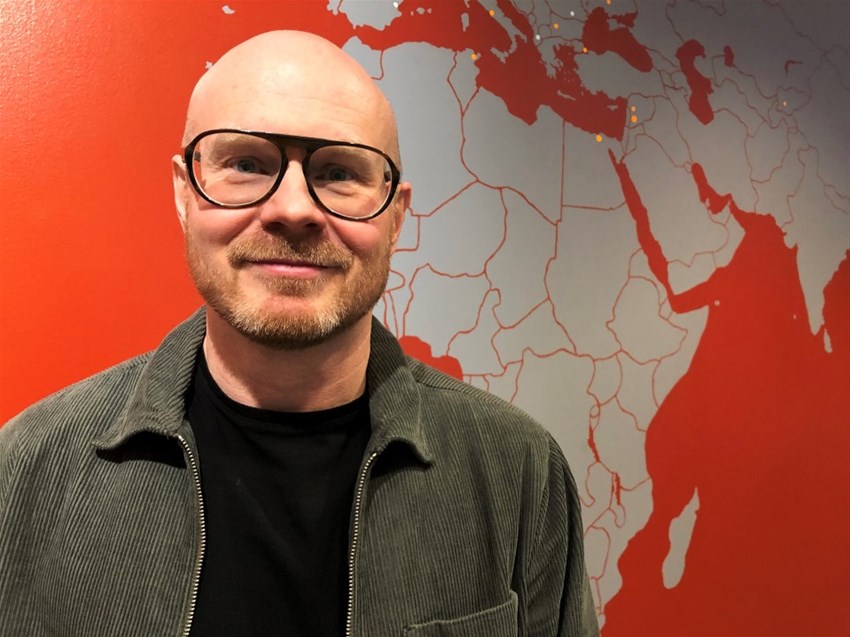‘When we rely on technology, we start thinking like machines’
24 Jan 2022
Digitalisation is increasingly present in our working lives, and we rely on machines and artificial intelligence more and more. ‘At the same time, people risk losing their unique ability to discern nuances, and perform informed evaluations. Our professional judgement can be eroded in the long term,’ says Anders Sandblad, the world's first doctor of Work Integrated Learning at University West.

‘My research shows that people gradually adapt their way of thinking and perceiving reality to the logic of technology,’ says Anders Sandblad, the world's first doctor of Work Integrated Learning at University West.
‘Digitalisation and artificial intelligence are centre stage at the moment. The debate is mostly about what the technology can be used for, and the risk of robots acquiring human abilities and characteristics.’
‘My research shows that there is a greater risk that people will gradually start to think like machines, as we perceive and view reality based on the logic and terms of technology,' says Anders Sandblad.
Anders' recent dissertation highlights the professional knowledge that is at risk of being lost in our increasingly digitalised workplace and society. And the importance of understanding and managing the consequences.
‘I am not critical of the technology per se, but of the exaggerated belief that it can solve tasks where humans are actually unbeatable. Humans have dimensions and abilities that cannot be transferred to machines. For example, robots cannot assess human needs, perceive nuances, and perform informed evaluations when it comes to complex situations and events.’
Unique abilities are lost
He explains that people's professional skills and unique abilities can be lost over time as we adapt our way of thinking and perceiving reality to the logic of machines. For example, we lose the practical and experiential knowledge that is used in individual situations – in the face of the unique and unexpected, and in situations that are so complex that they become impossible to fully control.
‘For example, a process description on paper does not tell the whole story, and requires experience to be used properly. This is known as tacit knowledge – knowledge that cannot be expressed precisely or fully as definitions, models and metrics. It is knowledge that develops when people share and reflect on their own and others' experiences. It also includes knowledge that can only be expressed when people are in the same physical place.’
Work quality is eroded
So what happens when people's professional skills slowly disappear?
‘As more and more tasks are transferred to technology, we tend to focus our responsibility on the technology and the processes we use, rather than on the task and its results. The consequence is that we gradually lose important human professional skills – our unique ability to discern nuances and perform informed evaluations. In addition, work quality is eroded.’
Some of the material on which Anders' research findings are based comes from a selection of groundbreaking case studies on professional skill and computer use from the 1970s and 1980s, in which Bo Göranzon and Ingela Josefson were pioneers. Both are currently affiliated with University West as post retirement professors. In addition, his research includes a couple of recent multi-year case studies of newly qualified engineers and other professionals with many years of practical experience from various industries.
He has carried out his research studies as an externally employed doctoral student, meaning that he has done his research in parallel with his regular work as a systems developer and trainer at Combitech in Växjö.
Education provides a humanistic perspective
Anders sees bildung as a tool for safeguarding people's unique knowledge and skills in the workplace. By bildung, he means knowledge and insights about people, life, and the use of technology.
‘When I trained as an engineer 25 years ago, my great interest in technology was a strong driving force. Today, I realise that technology education also needs to include humanistic elements that highlights the human aspects of technology use.’
‘By including literary classics, art and other cultural elements that concern the human relationship with technology, students can gain humanistic perspectives on technology development. Classic works by Ibsen, Strindberg and Shakespeare, for example, provide important insights into life, people, and the use of technology.’
Anders hopes that his research can help to raise awareness, and prevent the risks posed by technological developments.
‘People's professional skills need to be harnessed. Otherwise, there is a real risk that the wave of digitalisation we are in will backfire in a few years' time,’ says Anders.
Anders' research links the work integrated learning research field with the field of skill and technology.
Read Anders Sandblad's dissertation ‘Professional Skill. Machines. Humans.’
Watch a video about Anders' research
Read more about his research:
Contact: Anders Sandblad, Combitech
Email: anders.sandblad@combitech.com Phone: +46 709 89 16 07


